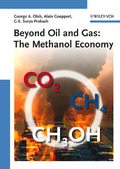Beyond Oil and Gas: The Methanol Economy

1. Edition February 2006
XIV, 290 Pages, Hardcover
110 Pictures
16 tables
General Reading
Short Description
In this masterpiece, the famous Nobel laureate discusses the use of methanol as a viable alternative to dangerous and dwindling energy resources. Olah weighs the pros and cons of our current main and alternate energy sources, while providing ways to overcome particular obstacles.
Buy now
Price: 27,90 €
Price incl. VAT, excl. Shipping
Euro prices for Wiley-VCH and Ernst & Sohn titles are only valid for Germany. In EU countries, local VAT applies. Postage will be charged.
- Out of print -
In this masterpiece, the renowned chemistry Nobel Laureate, George A. Olah and his colleagues discuss in a clear and readily accessible manner the use of methanol as a viable alternative to our diminishing fossil fuel resources. They look at the pros and cons of our current main energy sources, namely oil and natural gas, and varied renewable energies, and new ways to overcome obstacles.
Following an introduction, Olah, Goeppert and Prakash look at the interrelation of fuels and energy, and at the extent of our non-renewable fossil fuel resources. Despite the diminishing reserve and global warming, the authors point out the continuing need for hydrocarbons and their products. They also discuss the envisioned hydrogen economy and its significant shortcomings. The main section then focuses on the methanol economy, including the conversion carbon dioxide from industrial exhausts (such as flue gases from fossil fuel burning power plants) and carbon dioxide contained in the atmoshere into convenient liquid methanol for fuel uses (notably in fuel cells) and as a raw material for hydrocarbons. The book is rounded off with a glimpse into the future.
A forward-looking and inspiring work regarding the major challenges of future energy and environmental problems.
2 Coal in the Industrial Revolution, and Beyond
3 History of Oil and Natural Gas
4 Fossil Fuel Resources and Uses
5 Diminishing Oil and Gas Reserves
6 The Continuing Need for Hydrocarbons and their Products
7 Fossil Fuels and Climate Change
8 Renewable Energy Sources and Atomic Energy
9 The Hydrogen Economy and its Limitations
10 The 'Methanol Economy': General Aspects
11 Methanol as a Fuel and Energy Carrier
12 Production of Methanol from Syn-Gas to Carbon Dioxide
13 Methanol-Based Chemicals, Synthetic Hydrocarbons and Materials
14 Future Perspectives
"...a topical book, which challenges the important questions of this century. This book will contribute to the intense discussion to find the right answers. Some questions have been answered forward-looking."
Angewandte Chemie I.E.
"A lucidly written, attractively produced book this constitutes one of the best introductions - presented in the readable style of a definitive New Yorker magazine article...To all who care about alternative sources of energy and of chemical building blocks for the future this book is an invaluable guide." ChemPhysChem
"The book presents the reader with an analysis of energy history, an analysis of the status quo and a description of the methanol thesis. It is a book that should appeal to science historians, chemists and chemical engineers alike." Chemistry World
"... an interesting and thought-provoking book..."
Chemistry & Industry
"Throughout, the text and arguments presented are exceptionally clear and engaging. For anyone interested in the subjects of energy, fossil fuels, alternative fuels, and energy solutions, this book will be a valuable resource." Chemical & Engineering News
"When I first picked up this book, it looked technical, possibly of interest only to specialists. But then I began reading. Throughout, the text and arguments presented are exceptionally clear and engaging. For anyone interested in the subjects of energy, fossil fuels, alternative fuels, and energy solutions, this book will be a valuable resource." www.pubs.acs.org
"...The book is rounded off with a glimps into the future."
Metall
Alain Goeppert, PhD, was born in 1974 in Strasbourg, France. After obtaining his technician diploma in chemistry from the University Robert Schuman in Strasbourg, he received his Diplom-ingenieur degree from the Fachhochschule Aalen, Germany. He then returned to Strasbourg to study the reactivity of alkanes in strong acid systems under the direction of Prof. Jean Sommer at the Université Louis Pasteur, and earned his PhD in 2002. After this, he joined the groups of Professors Olah and Prakash at the Loker Hydrocarbon Research Institute as a research associate, supported partially by a Lavoisier fellowship of the Ministère des Affaires Etrangères Français. His current research centers on the transformation of methane and CO2 into more valuable products and CO2 capture technologies.
G. K. Surya Prakash, PhD, was born 1953 in Bangalore, India. After his B. S (Bangalore Univ.) and M. S (IIT, Madras) degrees from India he came to US in 1974 and obtained his Ph. D degree from the University of Southern California (USC) under the direction of Professor Olah in 1978. He is currently a Professor and Olah Nobel Laureate Chair in Hydrocarbon Chemistry at the USC at Los Angeles, California. His primary research interests are in superacid, hydrocarbon, synthetic organic & organofluorine chemistry and energy and catalysis areas. He is a prolific author with more than 500 scientific papers and co-authored or edited 7 books. He has received many awards and accolades including two American Chemical Society National Awards in Fluorine (2004) and Hydrocarbon Chemistry (2006).


